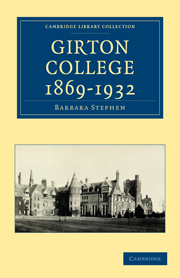Book contents
- Frontmatter
- Contents
- Preface
- Chapter I INTRODUCTION
- Chapter II PRELIMINARY WORK FOR THE COLLEGE
- Chapter III THE COLLEGE IN ITS PIONEER DAYS
- Chapter IV FROM HITCHIN TO GIRTON
- Chapter V GROWTH AND CONSOLIDATION 1875–1903
- Chapter VI A TIME OF TRANSITION 1903–1922
- Chapter VII THE ROYAL COMMISSION AND THE CHARTER
- Chapter VIII THE STATUTES OF 1926, AND THE NEW BUILDINGS
- Chapter IX VARIOUS MATTERS
- Biographical Index
- Index
- Plate section
Chapter VI - A TIME OF TRANSITION 1903–1922
Published online by Cambridge University Press: 05 July 2011
- Frontmatter
- Contents
- Preface
- Chapter I INTRODUCTION
- Chapter II PRELIMINARY WORK FOR THE COLLEGE
- Chapter III THE COLLEGE IN ITS PIONEER DAYS
- Chapter IV FROM HITCHIN TO GIRTON
- Chapter V GROWTH AND CONSOLIDATION 1875–1903
- Chapter VI A TIME OF TRANSITION 1903–1922
- Chapter VII THE ROYAL COMMISSION AND THE CHARTER
- Chapter VIII THE STATUTES OF 1926, AND THE NEW BUILDINGS
- Chapter IX VARIOUS MATTERS
- Biographical Index
- Index
- Plate section
Summary
Research work in the University. Movement for its endowment at Girton. Movement for changes in the government of Girton. Resignation of Miss Davies. Permanent Chairman of the Council. The Girton College Roll. The War. Miss Jex-Blake's Mistress-ship (1916–22). Jubilee of the College. Gifts for endowment of research. Royal Commission on the Universities. Titular degrees. Decision to apply for a Charter.
With the extension of 1902, the College attained to something approaching its full stature. Miss Davies aimed at 200 students; 160 were now secured, and the kitchens and dining hall were on such a scale as to make it possible to add rooms for more students when funds would allow. But the process of growth had been a difficult one, and the economies which had been necessary were a serious hindrance to developments other than building. Equipment was kept at the lowest possible level; the library and laboratories were greatly in need of expansion; and there were no endowments for Fellowships or for research work. Miss Davies, in her eagerness to open the doors of Girton to as large a number of students as possible, had always set her face against giving up rooms to research students, and was not very willing even to encourage students to stay on for a fourth year.
Research meanwhile was coming to occupy a more and more important position in the University. While the College was struggling into existence, profound changes were, as we have seen, being brought about at Cambridge.
- Type
- Chapter
- Information
- Girton College 1869–1932 , pp. 86 - 113Publisher: Cambridge University PressPrint publication year: 2010First published in: 1933

